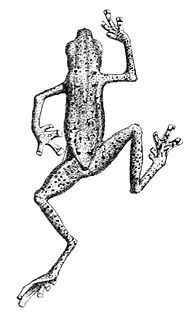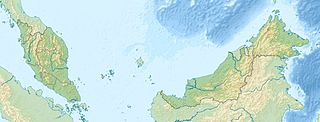
Megophryidae, commonly known as goose frogs, is a large family of frogs native to the warm southeast of Asia, from the Himalayan foothills eastwards, south to Indonesia and the Greater Sunda Islands in Maritime Southeast Asia, and extending to the Philippines. Fossil remains are also known from North America. As of 2014 it encompasses 246 species of frogs divided between five genera. For lack of a better vernacular name, they are commonly called megophryids.

Ansonia is a genus of true toads found in south India, northern Thailand, Malay Peninsula, Tioman Island, Borneo, and Mindanao (Philippines). These small forest species spawn in streams and have torrent-adapted tadpoles. Common name stream toads has been coined for the genus, although individual species are also being referred to as slender toads.

Pelophryne, commonly known as flathead toads or dwarf toads, is a genus of true toads, family Bufonidae. The genus occurs in the Philippines, Borneo, Malaya including Singapore, and Hainan (China). Molecular data suggest that Pelophryne is the sister taxon of Ansonia.

The Asian giant toad, sometimes referred to as the river toad, is a species of true toad native to Mainland Southeast Asia and the Greater Sundas. It is a medium-large toad, but it is easily confused with its larger relative, the giant river toad.

Leptobrachium hasseltii is a species of toad found in Southeast Asia. This frog named after Dutch Naturalist Johan Conrad van Hasselt. According to the current understanding, this species is known with certainty only from Java, Madura, Bali, and Kangean Islands, Indonesia. The species is also commonly reported to occur in the Philippines, but these are believed to refer to another, unnamed species.

Megophrys montana is a species of frog found in Java and possibly Sumatra.
Ansonia mcgregori is a species of toad in the family Bufonidae. It is endemic to the central and western Mindanao, the Philippines. The specific name mcgregori honors Richard Crittenden McGregor, an Australian ornithologist who collected the holotype. Common names McGregor's toad, McGregori's river toad, and McGregor's stream toad have been coined for it.

Atelopus chiriquiensis, the Chiriqui harlequin frog or Lewis' stubfoot toad, is an extinct species of toad in the family Bufonidae that was found in the Cordillera de Talamanca in Costa Rica and western Panama. Its natural habitats were stream margins in lower montane wet forests and rainforests. Its elevational range was 1,400–2,500 m (4,600–8,200 ft) asl.

Duttaphrynus noellerti is a species of toads in the family Bufonidae. It is endemic to the rainforests of southwestern Sri Lanka. It is named after Andreas Nöllert, a German herpetologist and photographer who first noted the distinctiveness of the species.
The Palawan toadlet or white-striped flathead toad is a species of toad in the family Bufonidae. It is endemic to Palawan, the Philippines.

Pelophryne misera, the black flathead toad or Kinabalu dwarf toad, is a species of toad in the family Bufonidae. It is endemic to northwestern Borneo and known from Sabah and Sarawak (Malaysia), although its distribution is likely to be broader and might extend to Kalimantan (Indonesia). It was first described from specimens collected from Mount Kinabalu.
Pelophryne rhopophilia, also known as lowland dwarf toad, is a species of toad in the family Bufonidae. It is endemic to Borneo and found in north-eastern and south-western Sarawak (Malaysia) and (likely) in adjacent West Kalimantan (Indonesia).
Oreophryne anulata is a species of frog in the family Microhylidae. It is endemic to the Philippines and is known from Mindanao, Biliran, Siargao, and Leyte; it probably occurs in some smaller, intervening islands too. Common names Mindanao cross frog and Davao cross frog have been proposed for it; the latter in apparent reference to its type locality, "Davao", even though it probably is in error.

Aphantophryne nana is a species of frog in the family Microhylidae. It is endemic to the Philippines and is known with certainty only from the island of Camiguin. It is unclear whether similar frogs from northeast Mindanao are referable to this species. It was described as Oreophryne nana, but based on molecular data it was moved to Aphantophryne in 2017. Common names Camiguin cross frog, Camiguin narrow-mouthed frog, and volcano cross frog have been coined for the species.

The spiny tree frog is a species of frog in the family Rhacophoridae. It is endemic to the Philippines and occurs on Mindanao, Leyte, Bohol, and Basilan, possibly wider.

Pelophryne linanitensis, also known as the Linanit dwarf toad, is a species of toad in the family Bufonidae. It is endemic to Batu Linanit in Mount Murud in Sarawak, Borneo.

Pelophryne murudensis, also known as the Murud dwarf toad, is a species of toad in the family Bufonidae. It is endemic to Mount Murud in Sarawak, Borneo.

Alcalus is a small genus of frogs in the family Ceratobatrachidae. It is the only member of the subfamily Alcalinae. Its sister taxon is Ceratobatrachinae. Common name Alcala's dwarf mountain frogs has been proposed for the genus. They are found in Palawan Island, Borneo, and the Malay Peninsula. They prefer semi-aquatic microhabitats.
Pelophryne ingeri is a species of toad in the family Bufonidae. It is found in the Peninsular Malaysia, Singapore, the Tioman Island (Malaysia), Sumatra (Indonesia), and possibly the Natuna and Mentawai Islands (Indonesia). In the past it has been confused with Pelophryne signata and P. brevipes.

Rentapia flavomaculata, also known as the yellow-spotted tree toad, is a species of toad in the family Bufonidae. It is endemic to the Malay Peninsula. Before being described as a distinct species in 2020, it was confused with Rentapia hosii.














